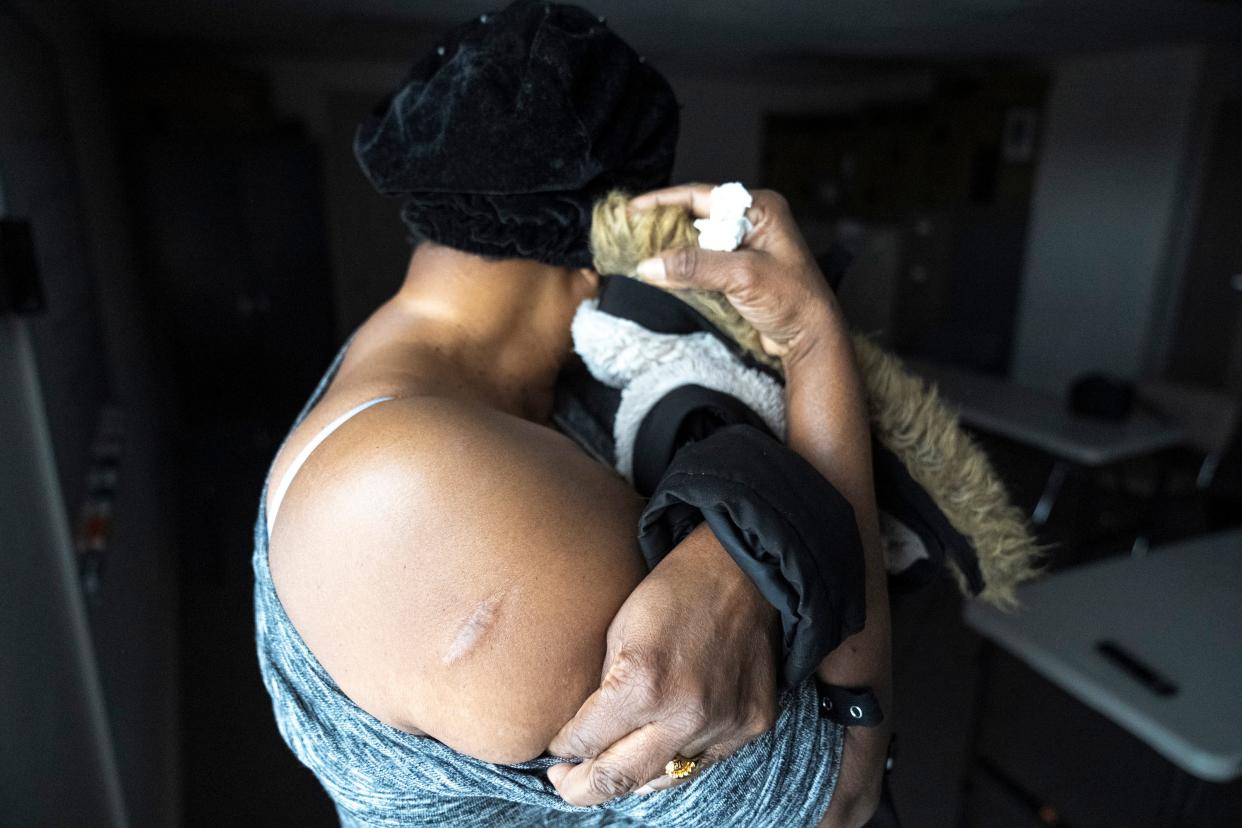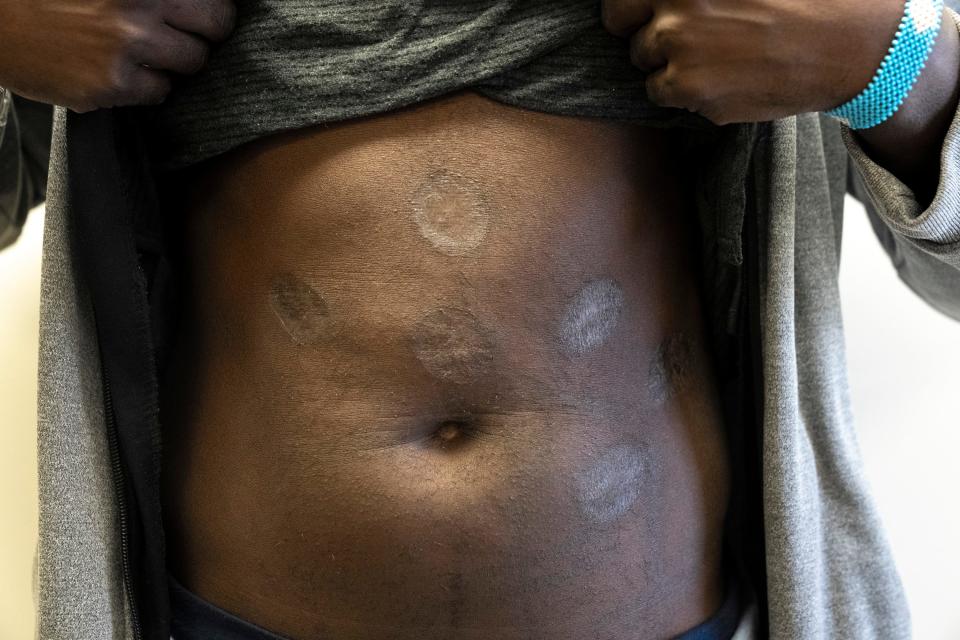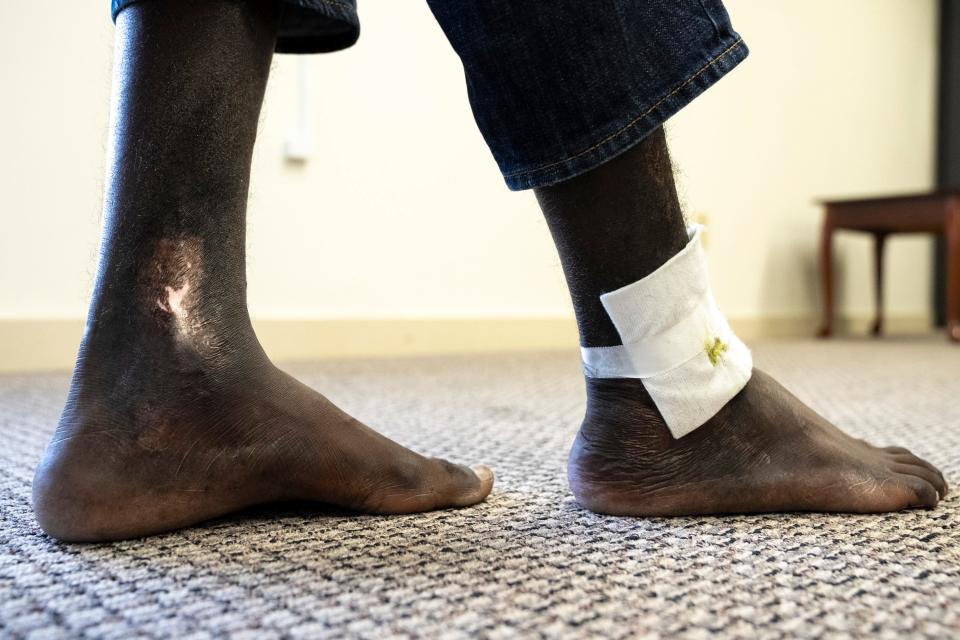'Guilty until proven innocent'? Advocates say Black immigrants face racial bias in court

Burn marks dot his abdomen.
A wound around his ankle from bindings is still healing, months after he escaped his imprisonment.
But the torture may not be over for the 34-year-old Mauritanian man, as immigration advocates are sounding the alarm about alleged racial discrimination in Ohio's only immigration court in Cleveland.
The East side man, who spoke on the condition of anonymity for fear of retribution and deportation, has been in the United States for three years. Before that, he was enslaved in his country.
"I live with uncertainty, which is torture inside of me because I'm living a life where I'm not sure if I will be granted asylum or be deported," he said, speaking with The Dispatch in Fulani via an interpreter. "If I go back, the same thing that happened to me will happen again."
Deportations of Mauritanians began in 2019 when former President Donald Trump changed policy to classify every undocumented immigrant as a priority for deportation, instead of the prior policy of prioritizing criminals. The change came after years of the government letting undocumented immigrants stay in the U.S. as long as they checked in with U.S. Immigration and Customs Enforcement (ICE).
The man, like many others, is now preparing to fight to live safely in the U.S. in immigration court.

But he's scared, as the court has not been finding in favor of survivors like him. Just ask Columbus immigration attorney Julie Nemecek, who represents many African asylum seekers in immigration court, and who said she has 80 to 100 such cases going through the court system.
“What I’m seeing is cases, solid cases, where clients, they have torture scars, they’re legitimate cases, and they’re being referred to removal proceedings,” Nemecek said. “I think they, overall, have a much slimmer chance of success.”
How does the immigration court system work?
Immigrants who have fled their nations and entered the U.S. seeking protection from persecution, human rights violations and death threats must apply for asylum, a form of protection granted to allow immigrants to stay here legally. Then, after an asylum interview, they may get a court date at one of the nation's 69 immigration courts and go before immigration judges, who are appointed by the U.S. Attorney General.
Immigration courts are civil courts, despite the fact that losing a case could mean an immigrant is sent back to a nation where they may be tortured or killed. Immigrants aren't guaranteed a government-funded attorney and must find and pay for their own representation, which can be very difficult, especially because asylum-seekers are often not legally able to work in the U.S.
In immigration cases, Department of Homeland Security attorneys argue against immigration attorneys and their clients as government representatives.
The Executive Office for Immigration Review (EOIR), part of the Department of Justice, is in charge of immigration courts and describes the proceedings as "quasi-judicial hearings."
In 2021, Cleveland immigration court had a higher rate of denying asylum claims than the nation's average, with 88% of asylum cases decided in the court from October 2020 to September 2021 denied, according to Syracuse University's Transactional Records Access Clearinghouse (TRAC), which gathers and analyzes data on immigration figures from government agencies.
That means that only 12% of applicants were granted asylum or another form of relief from deportation.
In comparison, nationally, only 63% of asylum cases were denied on average, according to the TRAC data.
Are Black asylum seekers facing different treatment in court?
In 2020, asylum seekers from Sub-Saharan Africa were deemed not credible in 8.5% of interviews, over 37% more often than, on average, for all nationalities that year, according to an August 2022 U.S. Shadow Report to the United Nations Committee on the Elimination of Racial Discrimination, submitted by several advocacy organizations.
“This data further confirms concerns raised about implicit racial and other bias in credibility determinations in US asylum adjudications," the report states.
The report notes that Black asylum seekers face different treatment in the immigration system than others, including longer than average detention times, trouble finding accurate and adequate interpreters, different treatment in court, lack of access to counsel, purposefully rushed proceedings, biased judges, wrongful denial of asylum and more.
Lynn Tramonte has seen all those scenarios happen in Ohio.

“In immigration court, it's almost like you're guilty until proven innocent and they would rather err on the side of deporting a refugee who was tortured than granting asylum to someone who might be lying," said Tramonte, director of the Ohio Immigrant Alliance, a group of Ohio immigrants and citizens who work to protect the dignity and rights of all through activism.
Nemecek has also seen judges and government attorneys "team up on (immigrants) and ask all kinds of questions and find them not credible."
From 2002 to 2022, 713 Mauritanians went before immigration judges in Cleveland, and 443 were denied asylum. Another 28 had another form of relief, such as withholding of removal, and 242 were granted asylum, according to TRAC.
The United States Department of State considers Mauritania so dangerous that it recommends U.S. citizens don’t travel there due to crime and terrorism.
Tramonte wishes judges would do more research on the nations where asylum seekers are coming from.
"They have zero knowledge of documents from other countries or even what it's like to be tortured," she said.
A spokesperson for the Executive Office for Immigration Review (EOIR) disputed those claims.
“Immigration judges consider all evidence and arguments presented by both parties, including country conditions, and decide each case in a manner that is timely, impartial and consistent with applicable law and case precedent,” said Gail Montenegro, an EOIR spokeswoman. “EOIR takes seriously any claims of unjustified and significant anomalies in immigration judge decision-making and takes steps to evaluate disparities in immigration adjudication."
Ohio immigration advocates and attorneys said they are puzzled over the reasons for denial of many Black immigrants' cases, which they see as strong, with evidence such as torture scars, and have concluded it must be racism.
In 2019, Cleveland Immigration Court Judge Teresa Riley, whose intimidating style has been noted in a previous Dispatch article, was harshly questioning a client from Mauritania who eventually fled the U.S. for Canada, according to Nemecek. The judge asked Nemecek’s client why they said, through a translator, that they crossed a body of water in a small boat and then changed it to canoe.
“It’s the same thing," Nemecek said of the case.
Immigration judges do not give interviews, nor does the agency comment on immigration judge decisions as the decision speaks for itself, Montenegro said.
Tramonte said she has read testimony of a Cleveland judge questioning how they should know a torture victims' scars were from being beaten and burned.

The immigrant in question had testified that he had been "beaten and burned," speaking through a translator in Fulani, and then later said, "burned and beaten."
"(The judge) was like, 'That's inconsistent,'" Tramonte said. But "there's more words in English than there are in Fulani," so interpretation cannot be word for word, she said.
Difficulty getting an accurate, quality interpreter can be another form of discrimination Black asylum seekers face, according to the report.
Both Nemecek and Ahmed Tidiane, a Mauritanian refugee and local activist, said the judges don't seem to understand and instead “tear them apart” when they say they speak multiple languages.
"Many others (judges and government attorneys) have said they're not credible because they didn't cry or they said, 'He doesn't seem upset,'" Tramonte added.
That can be a misunderstanding too, as some people may be trying to keep it together after all they've been through, she said.
"Their notions of what trauma looks like — having no experience or training in trauma — they don't know what it looks like in a Black Muslim man," Tramonte said of judges and government attorneys. "The way they talk to people, it's just really sick."
Judges receive "robust" training on asylum, torture, credibility, corroboration, trauma, language and more, Montenegro said.
The office also monitors judges through a performance and evaluation process and daily supervision by assistant chief judges, she said, but judges decide cases individually, due to U.S. immigration law, regulations and precedent.
Allegations of misconduct can be reported via the Department of Justice's website and immigration judges' decisions can be appealed, she said.
'I'm scared'
For immigrants like the Mauritanian man fighting to stay in Ohio, life back home was harrowing.
He was enslaved from 2016 to 2018 in Mauritania, before he was able to escape with someone's help.
Mauritania doesn't recognize its Black residents due to their skin color, and they are treated as a lower class than the majority Arab and Berber tribes, and have suffered brutal discrimination for decades, according to Human Rights Watch and the CIA World Factbook.

"I was working for someone who was employing me and took me as a slave," the man said. "He never paid me and started to abuse me."
Finally, the man ran away, but the journey was hard. He fled mostly on foot and once he reached Brazil, he walked to the U.S. southern border.
He spent six months in an immigration detention center in California before coming to Ohio, where there are approximately 8,000 Mauritanian natives — the biggest concentration in the country, according to community advocates.
His next hearing in immigration court is in September, and for now, it's just a waiting game punctuated by fear.
"My roommates went through this," he said of court. "I'm scared."
One of his roommates was told by a judge that they believed his story, but that there were some inconsistencies.
Instead of asylum, the judge granted him withholding of removal, a form of protection that offers less certainty than asylum, and leaves immigrants in a type of limbo, according to the American Immigration Council. They can’t leave the country or petition for their family members to join them, and they have no path to citizenship.
When activism backfires
Like the 34-year-old Mauritanian man, an East Side woman said she was discriminated against in her home country of Mauritania the entire time she lived there. Eventually, she got involved in politics, trying to fight against racial discrimination in her nation.
But her activism backfired.
The woman, 45, fled her nation in 2017 after her activism led to threats to her life. She said she was imprisoned twice, suffering torture and sexual abuse. She fled to avoid being imprisoned again.
She came to Columbus seeking asylum and community and has been to immigration court twice. The first time, she was provided with an interpreter who didn't speak the right dialect of her language, Fulani, and struggled to tell her story, she said.
"That day I knew if we continued the hearing they would've denied me," she added.
The second time was better, she said, with a good interpreter. Though she feels as though she has faced discrimination in America's immigration court system, she knows it would be worse if she went to trial in her own nation.
"I knew the trial wouldn't be fair in Mauritania," she said. "That's why I decided to run away."
Here, she has no fear for her safety, but she is concerned about if she will find the justice she seeks at her next hearing in January.
"I'm very concerned and fearful because I ran away from an unjust court and I'm coming to a court that I hope to be the opposite."

She didn't think she would face injustice in America but fears she will through the nation's immigration court system.
Tramonte isn't OK with what she sees happening in the court.
"(They're) definitely deporting people to harm," Tramonte said.
Tramonte knows some Mauritanians who were sent back to their country — some of whom she hasn't heard from in months, and she fears they may have been jailed or killed.
"(People) need to know how these courts are just a mockery and that they're really harming people," Tramonte said.
@DanaeKing
This article originally appeared on The Columbus Dispatch: Is immigration court racist? These attorneys, advocates say so.
